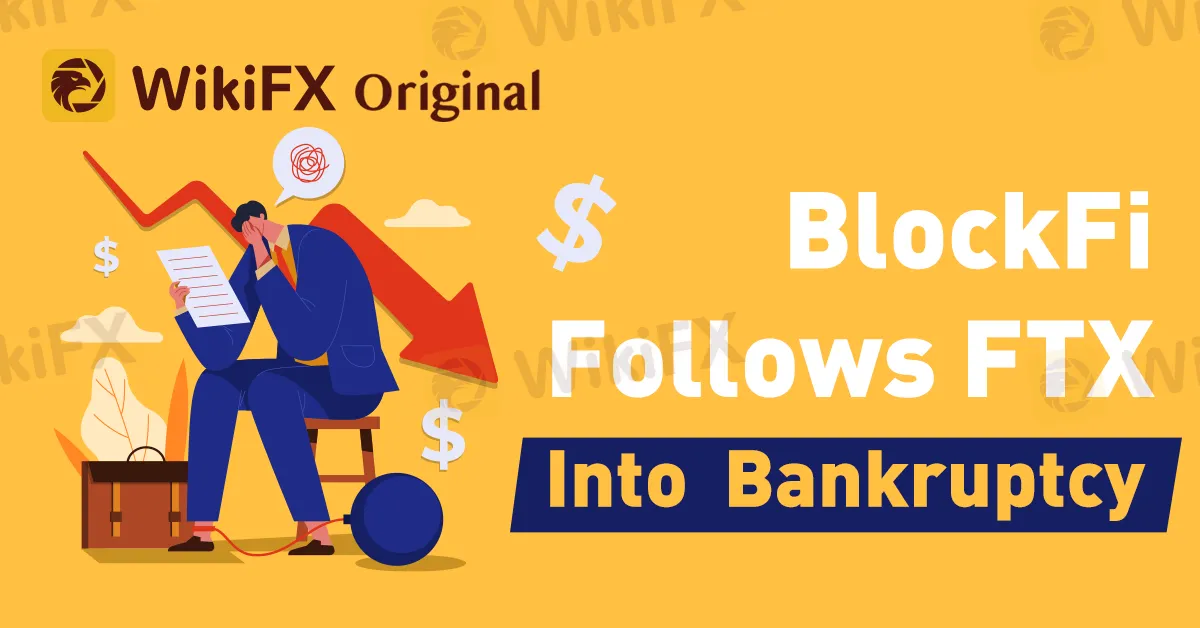简体中文
繁體中文
English
Pусский
日本語
ภาษาไทย
Tiếng Việt
Bahasa Indonesia
Español
हिन्दी
Filippiiniläinen
Français
Deutsch
Português
Türkçe
한국어
العربية
BlockFi Follows FTX Into Bankruptcy
Abstract:BlockFi Inc, a cryptocurrency lender just filed for its Chapter 11 bankruptcy on Monday, following the footsteps of FTX and further demonstrating the ripple effects in the crypto industry’s havoc.

The company announced that it was filing for Chapter 11 bankruptcy protection, indicating that it hoped to restructure while continuing operations. BlockFi, according to a press release, has approximately $257 million in cash on hand. A Bermuda-based subsidiary has also filed for liquidation, which is a similar procedure.
BlockFi's executives estimate the company has more than 100,000 creditors and checked off the ranges in the petition. According to executives, the company's assets and liabilities total between $1 billion and $10 billion.
West Realm Shires Inc., the legal name for FTX US, has a $275 million unsecured claim against the company, and the Securities and Exchange Commission (SEC) has a $30 million unsecured claim. Most of the names of its main creditors were withheld. Ankura Trust Company is BlockFi's largest creditor, which the lender appears to have hired in February and now has a $730 million unsecured claim.
BlockFi has had a difficult year, having suspended withdrawals a few weeks ago due to the ongoing uncertainty surrounding FTX's assets. Earlier this year, the company liquidated a large client and required a line of credit from FTX to survive. Following the demise of Three Arrows Capital, BlockFi CEO Zac Prince announced that the company had to liquidate a large client, though he did not specify whether or not it was Three Arrows. After CEO Zac Prince stated that the company needed capital to avoid a liquidity crisis, it signed a deal with none other than FTX, which gave the company access to $400 million in loans. The price of the transaction was an option from FTX to buy the lender for around approximately $240 million, a significant decrease from a peak valuation of $3 billion. Nevertheless, that option was never taken, and the collapse of the cryptocurrency exchange triggered a bank run at BlockFi, which customers saw as dangerously entangled with FTX.
In the midst of the confusion, BlockFi announced a suspension of withdrawals, claiming that it had some assets deposited on FTX and was still owed some of the credit extended by FTX. BlockFi warned clients not to deposit funds into its wallet or interest accounts after suspending withdrawals.
Download the free WikiFX app and check out the 24 hours a day news section to stay up to date on the most important events in the world of business.

What makes us different from other financial news websites is that we summarize key points into 1 single sentence, so say goodbye to lengthy articles full of complicated financial jargon.

The best part is that it is completely free! So wait no more and get downloading right now.

Disclaimer:
The views in this article only represent the author's personal views, and do not constitute investment advice on this platform. This platform does not guarantee the accuracy, completeness and timeliness of the information in the article, and will not be liable for any loss caused by the use of or reliance on the information in the article.
Read more

Vanuatu Passes VASP Act to Regulate Crypto and Digital Assets
Vanuatu's new VASP Act regulates crypto businesses, enforcing strict licensing, AML/CFT compliance, and investor protections.

Blockchain Decentralization: Empowering a Trustless Future
In recent years, blockchain technology has rapidly evolved from a niche innovation behind Bitcoin into a transformative force across industries. At its core, blockchain decentralization refers to the distribution of authority and decision-making away from a central entity and into the hands of a distributed network of participants. This shift redefines how data is stored and verified and paves the way for trustless, transparent, and resilient systems that challenge traditional centralized models.

Why the SEC Rejected the First U.S. Bank-Issued Stablecoin
The SEC rejected the first U.S. bank-issued stablecoin, citing regulatory concerns. This decision highlights the ongoing challenges in crypto asset classification and oversight.

UK Authorities Freeze Nearly $7.7 Million in Illicit Crypto Assets Within a Year
Crypto wallets tied to fraud and tax evasion were frozen under new enforcement powers granted in 2024.
WikiFX Broker
Latest News
Exposing the Top 5 Scam Brokers of March 2025: A Closer Look by WikiFX
Gold Prices Climb Again – Have Investors Seized the Opportunity?
Webull Launches SMSF Investment Platform with Zero Fees
Australian Regulator Warns of Money Laundering and Fraud Risks in Crypto ATMs
The Withdrawal Trap: How Scam Brokers Lure Victims into Paying More
FCA to Investors: Think Twice Before Trusting These Brokers
Trump\s tariffs: How could they affect the UK and your money
HTFX Spreads Joy During Eid Charity Event in Jakarta
How Will the Market React at a Crucial Turning Point?
Australian Authorities Joins Forces with Philippine Authorities to Combat Cyber Scams
Currency Calculator







